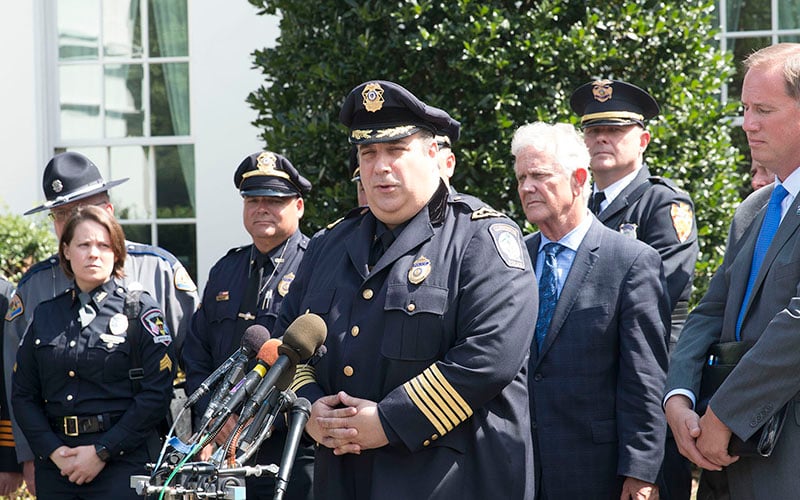
Gloucester, Massachusetts, Police Chief Leonard Campanello, outside the White House, said funding to fight opioid abuse is needed immediately, and he chided Congress for inaction. (Photo by Sophia Kunthara/Cronkite News)
WASHINGTON – Arizona would get $21 million over two years to combat opioid abuse as part of a $1.1 billion proposal pushed Wednesday at the White House to tackle the spread of the epidemic.
Police from around the country joined administration officials to call for immediate funding for opioid abuse treatment, as Congress haggled over the amount of funding that should be included to battle the epidemic, stalling opioid abuse treatment legislation in the process.
“There are people dying on both sides of the fence, it doesn’t matter Republican, Democrat,” said Gloucester, Massachusetts, Police Chief Leonard Campanello, who called congressional bickering over the issue “disgraceful.”
He was one of about a dozen law enforcement officials from nine states at the White House event. No Arizona police agencies were represented, but the state would get the 12th-highest amount of funding under the administration’s plan.
Arizona ranked 15th in the nation for its drug poisoning death rate in 2014, when it recorded 18.2 such deaths per 100,000 people, according to data provided by the White House. That was well above the national rate of 14.7 deaths per 100,000.
Editor’s note:
A previous version of this story misspelled the name of Andrew LeFevre, the executive director of the Arizona Criminal Justice Commission. The story here has been corrected, but clients who used the previous version of this story are asked to use the correction that can be found here.
In 2014, according to the Centers for Disease Control and Prevention, opioid use was involved in 28,647 deaths in the United States. The CDC said the number of overdose deaths from prescription opioids nationwide quadrupled between 1999 and 2014.
National Drug Control Policy Director Michael Botticelli said Tuesday in a call with reporters that the funding proposed in the administration plan – first unveiled in February – would go toward prevention, treatment and recovery, with access to treatment being a focal point.
Arizona lawmakers passed two bills this year aimed at opioid abuse prevention and treatment. The bills, signed into law in May, would require doctors to record opioid prescriptions in a database that they and other doctors would then have to check before prescribing the drugs to a patient. A second measure would let pharmacists dispense the drug-overdose medication Naloxone without a prescription in certain situations.
“The legislation signed this year is an important step to prevent and treat opioid addiction in Arizona,” Torunn Sinclair, a spokeswoman for Gov. Doug Ducey, said in a statement.
“Governor Ducey is committed to ensuring more substance abuse treatment options are readily available while we proactively work to reduce the amount of Arizonans abusing opioids,” her statement said.
Andrew LeFevre, executive director of the Arizona Criminal Justice Commission, said the commission has been involved with some pilot programs for opioid prevention and treatment across the state, such as education initiatives and dropboxes for unused prescription drugs. LeFevre said abuse of prescription opioids often leads to heroin use.
Read more:
See the Cronkite School’s award-winning news report, Hooked: Tracking Heroin’s hold on Arizona.
“Unfortunately, people get hooked on these medications … they end up transitioning over to heroin just because it’s cheaper,” LeFevre said.
He added that additional funding would help Arizona.
“We can’t focus on just one part of the problem,” LeFevre said. “We can’t just focus on education or law enforcement…we have to focus on all of it. Money being made available is a good thing always.”
Campanello said the need for funding is immediate, as people die daily from overdoses of opioids, particularly heroin. He said addiction is a disease, and treatment for it should be just as accessible as treatment for any other disease.
“You never say no to someone with cancer or diabetes, nor do you arrest someone with cancer or diabetes,” Campanello said.
John Rosenthal, a Massachusetts developer who was also at the White House event, said more law enforcement officials are recognizing that addiction needs to be treated, and that Congress should approve funding as the epidemic continues.
“There’s only two long-term choices: treatment or death,” said Rosenthal, president of Meredith Management.